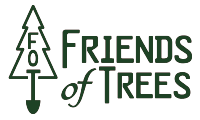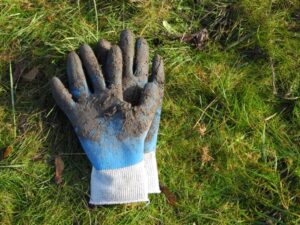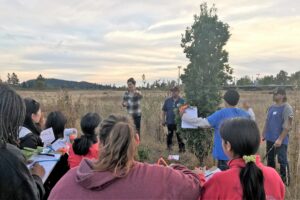Tag: adult training program
Get To Know Connecting Canopies
This coalition creates new pathways into the green workforce
In January, a new cohort will begin Friends of Trees’ Adult Urban Forestry and Restoration Training Program, a 10-week curriculum and internship designed to increase career opportunities for underrepresented communities in the urban forestry and natural area restoration fields. Many of those participants come to us through Connecting Canopies, which offers a 9-month training in urban forestry and restoration to BIPOC young adults. Their time with Friends of Trees is one piece of that training, focused on a community approach to planting trees.
Connecting Canopies is a coalition formed by the Blueprint Foundation, the Urban Greenspaces Institute (UGI) and The Nature Conservancy with the goal to create a more equitable canopy cover in the Portland metro region and beyond. Their approach is twofold. First they want to address many of the financial and policy barriers that keep many people from access to trees and their benefits. UGI analyzes tree codes and policies, both to open up conversations with government entities and to select project sites based on where trees are most needed.
Second, they want to increase community knowledge and reduce barriers to trees and green infrastructures by providing access into the green workforce for BIPOC communities. Their workforce development program creates real world opportunities for participants by placing them with five training partners over the course of the program.
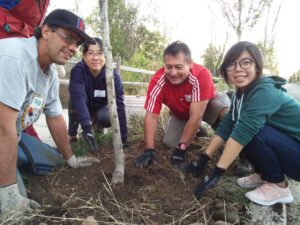
“When people work in the forestry or restoration field, their skills and knowledge trickle down into their community,” says Theresa Huang, Partnerships & Planning Manager at the Urban Greenspaces Institute. “We’re hoping that this will help the community keep the trees that they have and encourage them to plant more.”
In addition to working with Friends of Trees on community forestry and restoration, these 12 trainees work with the Portland Fruit Tree Project to learn about planting and caring for fruit trees, with Meadowsweet Gardens to learn about landscape design, and with Audubon and Ash Creek Forest Management to learn about habitat restoration.
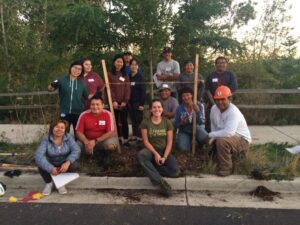
“Getting into the field is really hard,” Theresa says. To overcome some of those barriers, trainees are paid for their time. Connecting Canopies was started to be community led and center community voices, so that these BIPOC trainees are able to enter a workforce that they were typically left out of.
For Theresa, the partnership with Friends of Trees makes perfect sense. “When you think about community forestry, you think about Friends of Trees,” Theresa says. “They’ve nurtured so many people who have grown to love trees.”
Build Trust, Make an Impact
Our new EDI & Workforce Training Manager on community relationships
Our Adult Urban Forestry Workforce Training Program is a project with the power to change lives and build community. “It’s one of the more impactful things we’ve done, period,” says Rudy Roquemore, our new EDI & Workforce Training Manager.
Rudy is no stranger to Friends of Trees. He has worked in our Neighborhood Trees program since 2016. Always passionate about issues of equity, diversity and inclusion, he is the perfect fit to step into the role of EDI & Workforce Training Manager.
He brings to the role a philosophy of relationship building that seeks to be more equitable and less transactional. “When we work with an organization, it’s important to make sure we’re aligned in our goals,” Rudy says. “Build trust, then project plan.”
Rudy believes this sort of relationship allows for innovation and growth. We can more readily meet the needs of the organizations we work with, and together, do more thorough work. “The Adult Urban Forestry program has been a tangible way for us to visualize what that pathway can look like,” Rudy says.
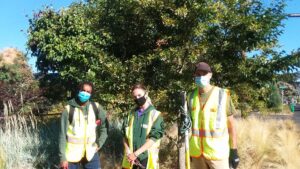
The program enrolls adults in a ten-week urban forestry curriculum and places them in a 100-hour internship with Friends of Trees or an affiliated partner organization. The program, which is designed to engage communities underrepresented in the urban forestry and restoration field, empowers participants to attend by paying them for their time, and creates a pipeline to actual jobs.
“We can make trees relevant to people’s lives,” Rudy says, “by addressing and eliminating barriers to the green workforce. There is a lot of opportunity to grow this program and make a real impact.”
Over the years program partners have included Verde, APANO, Wisdom of the Elders, Rosemary Anderson High School-POIC, Black Parent Initiative, and the Blueprint Foundation. These organizations help select 10-15 program participants each year, who begin with classroom curriculum and field work, and proceed to paid internships.
Future Urban Forestry & Restoration Professionals: A new education & training program
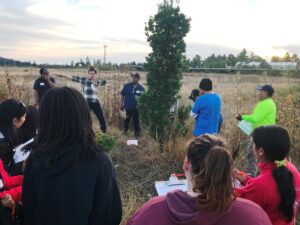
“One of the things I love most about Friends of Trees and this program is it’s helping me expand my understanding of community. I get to go to all of these places I never knew about and plant there. That is one of my things I’m personally striving for – learning more about my community.” Alyssa, POIC leader and Adult UF training program participant
Friends of Trees recognizes that not everyone has equal access to the benefits of urban trees and healthy green spaces. During the past five years, we have made concerted efforts to include equity, diversity, and inclusion in all aspects of the organization, including hiring practices, volunteer recruiting, and planting street and yard trees in under-served, under-canopied neighborhoods. We also recognize that our region’s urban forestry landscape would benefit from EDI efforts, and the diverse communities we work to engage and serve would benefit from opportunities to engage directly with urban forestry.
Our Adult Urban Forestry Training & Internship Program, funded by the East Multnomah Soil & Water Conservation District, is a 12 week, paid training program focusing on urban forestry and restoration topics. The 12 program participants were selected by local Community Benefit Organizations (APANO, POIC, VERDE, and Wisdom of the Elders) that are also Friends of Trees partners. Program participants attended weekly training sessions focusing on landscape design, tree identification, tree maintenance, ecological site design, environmental justice, and careers in urban forestry.
Key components of this training program include classroom time, field work, and a session dedicated to resume-building and interview skills. Upon completion participants are connected with a 100 hour paid internship with local urban forestry or other restoration programs.
Friends of Trees’ Equity, Diversity & Inclusion Specialist Surabhi Mahajan talks about the community building that took place during the training,
“The best part about it for me was the community that was built with the training sessions. The first training session was a little bit awkward, not a lot of people were talking, people wanted more information about the program itself. But as the sessions went on, participants got comfortable with each other and learned from each other. Some folks had more knowledge about medicinal properties of trees and talked about it with other participants, others grew food in their community garden plots and brought hot peppers to share with everyone. There was such a sense of community with each other in the room that participants were asking me if we can all get together again outside of the training, ‘because we’ve built a sort of community together.’ I call that success!”
Multiple conservation issues are addressed through this program. Our experience is that in general our community is disconnected from their watersheds and the ongoing activities that improve natural areas, public green spaces, trees, and water quality. We created opportunities for Community Benefit Organizations to engage in this work and for communities of color to engage in workforce development opportunities in the conservation sector. Through this program we are also helping to restore a critical natural area (the Powell Butte Lower Flood Plain in SE Portland), planting street trees in Portland neighborhoods, and building connections between individuals and local leaders in the urban forestry field.
Above photo: It’s a bird, it’s a plane, it’s Friends of Trees Neighborhood Trees Vancouver Specialist Megan Van de Mark! Megan is demonstrating canopy spread during a program field trip at the Dharma Rain Zen Center.
Special thanks to Meyer Memorial Trust, whose grant support helps fund our new EDI Specialist position, which was critical to this training.
